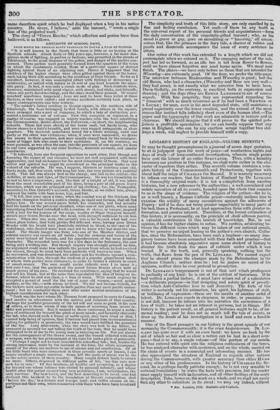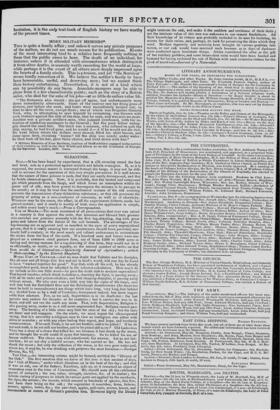LINGARD'S HISTORY OF ENGLAND—VOLUME SEVENTH*.
IT may be thought presumptuous in a journal of seven days gestation, to sit in judgment upon the work of years—of numberless nights and days of study—of long-continued investigation, wherein single points have cost the labour of an entire SPECTATOR. Thus, with a humility becoming our position in this instance, we shall write rather in the character of reporters than critics. This seventh volume contains a complete history of the Commonwealth and Protectorate, together with about half the reign of CHARLES the Second. It is scarcely necessary to inform our readers, that the history of England by Dr. LINGARD is a thoroughly original work : it is not a compilation from existing histories, but a new reference to the authorities ; a well-considered and sedate narration of all its events, founded upon the whole that remains to us in the shape of evidence. The religion of the author—for he is, as is well known, a Roman Catholic 'priest—naturally inclines him to examine the Solidity of Many accusations against the adherents of Popery: and if he does not bring greater impartiality to many parts of his task:than a Protestant, he at least approaches them with greater information, and greater interest. Therefore, at the lowest estimation of this history, it is necessarily, on the principle of Audi alteram ,partem, a valuable contribution to this branch of knowledge. But, in our opinion, it has far higher claims to notice. We confess, arbitrating between the different views which may be taken of our national annals, that we perceive no unjust leaning to the author's own church. Catholics, since the Reformation, have been such a bugbear—so many imaginary terrors have been connected with their faith and practice—that it had become absolutely imperative upon some student of history to disinter the truth from the mass of rubbish under which it was buried. It is the truth, and, generally speaking, nothing but the truth, that flows from the pen of Dr. LINGARD. We cannot expect that he should praise the changes made by the Reformation in the Anglican Church ; neither does he : but he makes no secret of his opinions, neither does he ever pretend to proselytize.
Dr. LINGARD'S temperament is not of that sort which predisposes to partiality of any kind: he is one of the coldest of historians. If he had written a partial history, it must have arisen out of a calculation —a deliberate purpose—in that designing and astute spirit of proselytism which Anti-Catholics love to call Jesuistry. The forte of this writer is certainly not his animation, his spirit, his lightness of style, or brilliancy of expression—these are the merits of another order of talent. Dr. LINGARD excels in clearness, in order, in precision : he is not dull, because he infuses into his narrative the earnestness of a love of truth : he takes not an interest in persons, but in things. His history is the patient result, as all general histories ought to be, of immense reading ; and he does not so much tell the tale of events, as draw up the heads of his investigation in a lucid and even a forcible manner.
One of the finest passages in our history is the great episode of our monarchy the Commonwealth : it is the crux historicorum. Dr. LINGARD has gone over it with an even hand: we know no book by the aid of which so fair and so clear a notion can be had in a short compass—that is to say, a single volume—of this portion of our annals. He has entered with spirit into the religious enthusiasm of the times, he has analyzed character with acuteness, and on the whole, carried on the chain of events in a connected and interesting manner. He has also appreciated the situation of England as regards other nations during the Commonwealth, with greater accuracy than either Huns or any other of his predecessors. In his history of CHARLES the Second, he is perhaps hardly patriotic enough : he is not very sensible to national humiliation : he states the facts with precision, but the reader must supply himself with indignation, and all other feelings of the acute description. Take, however, the work as a whole, and we shall not easily find any other to substitute in its stead: we may say indeed, without
* 4to. London, 1829. Baldwin and Cradock.
hesitation, it is the only text-book of English history we have worthy of the present times.



















 Previous page
Previous page